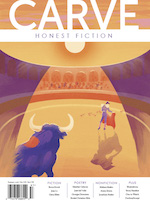Heather Cahoon received an MFA in Poetry from the University of Montana in 2001 where she was the Richard Hugo Scholar. “Death as a Lens” comes from her recently-completed manuscript, Horsefly Dress. Cahoon is from Montana and is a member of the Confederated Salish and Kootenai Tribes.
Heather's poem "Death as a Lens" will appear in the Summer 2018 issue of Carve. Preorder or subscribe by Sunday, July 1, for special savings and discounts.
What was the inspiration behind this poem?
My sons and father and I were out for an afternoon drive in the woods and on the lookout for grouse for dinner. After getting our first one, my father carefully showed my little boys the delicate pouch behind its throat, cutting it open so they could see what it had been eating. As he cut open its craw and I saw it contents, I was struck with the sense that I was seeing something deeply private, something so revealing of another’s private behaviors and choices that somehow I felt more uncomfortable knowing what it had eaten (and that it had eaten) than actually knowing we were going to have it for dinner. I also felt a subtler awareness of the power dynamics at play in all of it, too; one of us was going to come out of the situation as the casualty.
This sort of complex web of feelings prompted me to want to examine more closely another instance that had some overlap in terms of it being a highly-impactful experience where an individual’s most private behaviors were exposed and where the power dynamics were hugely uneven.
The second stanza is a reference to a memory, but it is unclear what that memory exactly is. What was the reason for not fully exposing it?
I chose not to detail the experience partly because I wanted to focus on the feelings it generated in me. I wanted to try to understand the commonalities of these two disparate instances because they shared something that was difficult to describe, but something I felt very strongly.
The poem deals with the idea of being exposed, in every sense of the word, but particularly being exposed to violence, or as the title indicates, to death. Can you speak more to your beliefs on how such an experience might change a person or how it effects the “lens” of how one sees the world?
When you witness something out of the ordinary, particularly if it involves violence or fear, it triggers immediate and profound changes in your conscious and subconscious mind, or, as they say, it instigates a paradigm shift—the world suddenly looks very different to you than it had prior to the experience. In this sense, it causes the death of your old view of things and the experience becomes part of the new lens through which you perceive the world.
The last line of the poem—“the sharpest knowing is with one’s eyes”—speaks to the power of witness to shape knowledge. How do you believe this relates to poetry and writing?
In general, poetry bears witness to a broad range of things over time and intimately chronicles the human experience in all its varied ugliness and beauty. Coming from a traditionally oral culture where poetry historically didn’t take a written form, I would say that the act of making poetry, or songs or other storytelling forms, helps preserve past wisdom and provides a kind of road map that can guide future generations through similar experiences. I know that I find immense value and essential insights in the oral traditions of my ancestors.
Can you describe your writing and editing process in relation to this poem?
I think I worked on this poem for three or four years before I felt like I understood the second experience (the memory of violence) enough to articulate the ending. It was in writing the poem that I think I processed the event. I once heard someone say that poetry wounds us, but not all wounds should be made into poems. I felt this was an exception.

